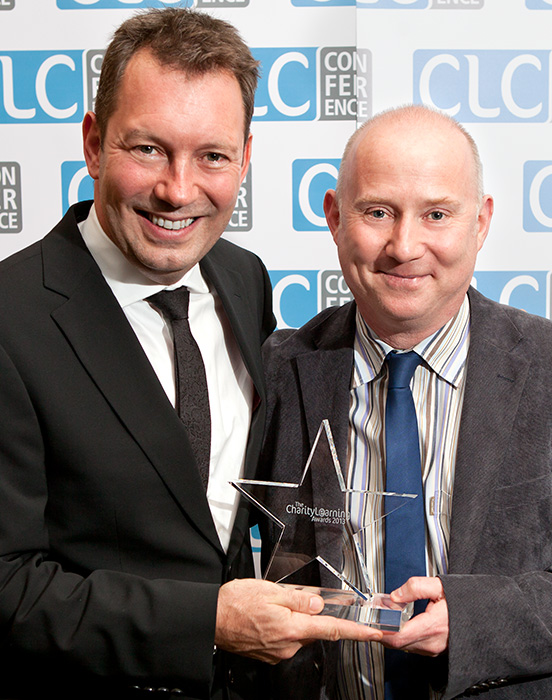
Thinking outside the box to create bespoke eLearning
Hanover housing association’s L&D team wanted bespoke eLearning, but couldn’t afford the hefty price tag – so they trained themselves in instructional design instead. A training investment of £5,000 has so far saved an impressive £80,000, and that amount grows with every eLearning course they create. This great example of ‘thinking outside of the box’ really impressed the judges of the Charity Learning Awards, who declared Hanover a worthy winner of the award for ‘Amazing Use of Resources’.
Hanover housing association wanted to develop their own in-house eLearning, to reflect its policies, processes and branding. But outsourcing to external developers was cost prohibitive, at £6,000 per 30 minute course. So the L&D team decided to train three of their members to become in-house eLearning designers instead.
This involved training in eLearning design, and they also attended a Charity Learning Consortium course to become competent in using Adobe Captivate. This cost, whilst being significant, was still less than the cost of procuring just one externally designed 30 minute e-course. An amazing return on investment!
The two key barriers to overcome were:
- Gaining confidence to successfully move from classroom training design to providing engaging e-courseware. This was overcome by establishing team scoping and design sessions, to add support and fun in their leap to create Hanover eLearning. This approach has been so successful they now do this for webinars too.
- Initially finding good imagery. But they established a good relationship with the Hanover marketing team to access existing image libraries, used in Hanover publications and on its website. These were free of charge, creating huge savings compared to buying stock artwork.
They quickly progressed to confidently produce good quality, effective in-house eLearning. In the last two years, members of the L&D team have created the following e-courses:
IT systems:
- OPENHousing Management System x 4
- Office 2010 Introduction
- DCal Procurement Card x 2
- Ebuy Purchasing
Policy and Procedure:
- Antisocial Behaviour
- Fire Awareness
- Understanding Bribery
- Effective Appraisals x 3
- Equality and Diversity x 3
As a result, staff feel eLearning is more relevant to their roles, and are more engaged with the eLearning suite supplied by the Charity Learning Consortium. Following the release of the Equality & Diversity courses, there were 80 voluntary completions in the first two months alone.
ELearning design is now embedded as a training team competence and areas of the business proactively ask for bespoke eLearning solutions. The cost savings have been massive: having developed 17 courses Hanover has now saved more than £79,000. This cost-benefit increases with every course they create - and plenty more courses are planned.
Andy Lancaster, Learning & Development Manager, Hanover commented: “The Charity Learning Award means so much to the Hanover L&D team who have approached the challenge of creating in-house eLearning with real enthusiasm. We have learned so much on the journey – and are continuing to do so - and the award is a brilliant milestone.”
Top tips for creating bespoke eLearning by Andy Lancaster, Learning & Development Manager, Hanover:
- Invest in team training - it has a cost but is vital to gain understanding and creativity.
- Storyboarding is essential: time spent planning learning progression ‘wins time back’ when creating.
- Designing interactivity is vital for engaging eLearning. Pick up brilliant ideas by looking at e-courses created by others such as Tom Kuhlmann.
- Graphic design skills are a key to e-design. Gain an understanding of design and layout. Establish effective graphic design principles from day one.
- Allocate sufficient time for staff and subject matter experts to test modules.
- Create an in-house branded template. Add slides of interactive activities on an on-going basis which can be re-worked for other courses.
- Establish subject matter experts to create the content and to monitor changes and ‘future proof’ courseware.
- Manage organisational expectation and proactively manage when development time is offered to the business. Be aware that the demand resulting from your success may exceed capacity!


